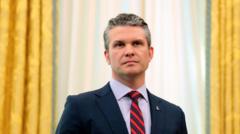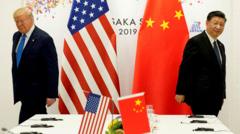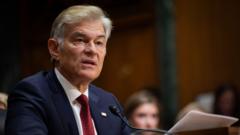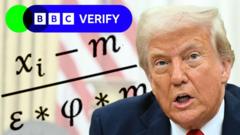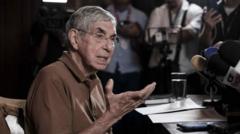General Timothy Haugh and other high-ranking officials were relieved of their duties amid allegations of disloyalty, prompting bipartisan outrage and fears for national security.**
National Security Shakeup: Trump Administration Dismisses Key Officials**
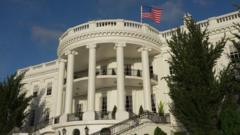
National Security Shakeup: Trump Administration Dismisses Key Officials**
The White House's recent firings of top national security personnel raise concerns over the future of U.S. intelligence integrity.**
The Trump administration has made significant changes to its national security landscape with the dismissal of General Timothy Haugh, head of the National Security Agency (NSA) and US Cyber Command. This decisive action raises eyebrows and concerns about the stability and integrity of U.S. intelligence operations. Reports indicate that the firings are part of a larger effort to eliminate officials deemed unsupportive of President Trump’s agenda, following a meeting with far-right activist Laura Loomer.
Democrats have expressed widespread alarm over Haugh's termination, fearing it undermines national security. Though the administration has remained vague about the reasons behind these decisions, Loomer is believed to have played a role in influencing personnel changes due to her allegations of disloyalty within the agency. In the wake of these firings, Trump's comments on Air Force One suggested a readiness to remove staff that do not align seamlessly with his administration's goals.
Alongside Haugh’s removal, other notable dismissals included several officials from the White House National Security Council (NSC), suggesting a broader evaluation of loyalty among key personnel. This purge builds on existing tensions within the administration, especially following a controversial incident last month when a journalist inadvertently gained access to sensitive military discussions, further questioning the reliability and security protocols within national security operations.
Sources close to the situation indicated that the recent shakeup may stem from discontent regarding staff attendance at outside meetings, with some officials reprimanded for engagement with individuals not directly aligned with the President's perspectives. As investigations continue concerning protocol breaches, the ramifications of these personnel changes remain to be seen, with ongoing scrutiny from both sides of the political aisle.
Ultimately, the implications surrounding these dismissals could reshape the landscape of U.S. national security management, with many calling for transparency and accountability to maintain integrity in these critical positions.
Democrats have expressed widespread alarm over Haugh's termination, fearing it undermines national security. Though the administration has remained vague about the reasons behind these decisions, Loomer is believed to have played a role in influencing personnel changes due to her allegations of disloyalty within the agency. In the wake of these firings, Trump's comments on Air Force One suggested a readiness to remove staff that do not align seamlessly with his administration's goals.
Alongside Haugh’s removal, other notable dismissals included several officials from the White House National Security Council (NSC), suggesting a broader evaluation of loyalty among key personnel. This purge builds on existing tensions within the administration, especially following a controversial incident last month when a journalist inadvertently gained access to sensitive military discussions, further questioning the reliability and security protocols within national security operations.
Sources close to the situation indicated that the recent shakeup may stem from discontent regarding staff attendance at outside meetings, with some officials reprimanded for engagement with individuals not directly aligned with the President's perspectives. As investigations continue concerning protocol breaches, the ramifications of these personnel changes remain to be seen, with ongoing scrutiny from both sides of the political aisle.
Ultimately, the implications surrounding these dismissals could reshape the landscape of U.S. national security management, with many calling for transparency and accountability to maintain integrity in these critical positions.


